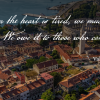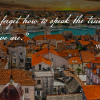
Published: October 31, 2002
View the Original Newsletter: Iskra-115.pdf
About This Issue
Iskra No. 115 opens with one of Valentina Krčmar’s most powerful and introspective essays — a decade after the discovery of the mass grave at Ovčara. Ten years on, justice remains elusive, and Valentina refuses to let complacency replace remembrance.
This issue balances national outrage with moral self-examination. She doesn’t only condemn foreign perpetrators or international courts but also turns her critical eye inward — toward Croatian leaders and citizens who, in her words, “chose silence when courage was needed most.”
The tone throughout the issue is heavy with loss, yet unwavering in its call for truth.
Editorial: “Ten Years After Ovčara”
Valentina opens by reflecting on the haunting passage of time since November 20, 1991, when over 200 wounded soldiers and civilians were executed at Ovčara following the fall of Vukovar.
She recounts how Dr. Clyde Snow, a UN forensic expert, revealed the existence of the mass grave in 1992 — a year after the massacre — and how it took until 1996 for the victims’ remains to be exhumed and given proper burials.
“Ten years later, not one of the responsible has been truly punished. We whisper their names in sorrow but rarely speak them in justice.”
Valentina condemns the inaction of the international community, but she also questions Croatia’s own conscience.
“Yes, the world is guilty — but so are we, for letting the truth of Vukovar fade into politics and excuses.”
Motrišta: “Our Share of Guilt”
In her column Motrišta, Valentina refuses to let national pride obscure accountability.
She acknowledges the known culprits — Slavko Dokmanović, Mile Mrkšić, Veselin Šljivančanin, and Miroslav Radić — but points out that justice extends beyond the accused.
“We keep saying no one has been punished for the crimes in Vukovar, thinking of them. But what about us? What about our own?”
She accuses elements within Croatia’s wartime leadership of negligence, arguing that weapons meant for Vukovar never arrived, either through oversight or political calculation.
“Someone decided that the fall of Vukovar would serve as a warning to the world — and for that decision, someone in our own government bears guilt.”
Valentina challenges readers to confront the moral cost of silence and the convenience of forgetting. She calls for the unsealing of documents, open testimony, and public truth — not only about foreign crimes but also about domestic failures.
“The time has come to open the files on Vukovar — not only to name the enemies who shelled it but those among us who let it burn.”
Her message is clear: remembrance without accountability is hollow.
National Headlines
The issue captures a turbulent political landscape:
-
The Bobetko Affair: Prime Minister Ivica Račan confirms that Croatia faces increasing pressure from the Hague Tribunal over General Janko Bobetko’s indictment. While the government vows not to surrender him, divisions deepen between those defending national dignity and those urging international compliance.
-
Carla Del Ponte’s Visit: The Hague’s chief prosecutor visits Zagreb, insisting on Croatia’s full cooperation. Valentina’s tone throughout remains skeptical of the Tribunal’s moral balance, seeing political interests where justice should prevail.
-
The Hague Expands Its Reach: Forty-eight more indictments are issued in Bosnia and Herzegovina, further widening the sense of persecution among defenders of the Homeland War.
Cultural Life
Amid political turbulence, the Croatian community abroad continues to thrive:
-
KUD “Napredak” Hamilton celebrates its annual meeting, highlighting leadership by Anela Miličević, Sanja Bahorić, and Stanislav Dodig, among others.
-
Croatian Society “Međimurje” announces a banquet to mark its 10th anniversary, a reflection of how diaspora organizations preserve identity through celebration and connection.
-
The Croatian Fund “Slavonija” promotes its autumn charity event “Slavonsko Kolinje,” blending tradition and community support.
Pismo Urednice: “What Remains of Responsibility”
Valentina addresses her readers with gratitude and humility, acknowledging financial difficulties that forced Iskra to shift from a biweekly to a monthly publication. She thanks supporters and advertisers, urging the community to help keep Croatian voices alive in Canada.
She speaks with warmth about the coming Christmas season and reminds readers to extend generosity to those in need — in Canada and Croatia alike.
“Only when we share what we have do we truly celebrate.”
Health & Wellness
The issue includes a series of educational features — written in Valentina’s familiar blend of empathy and practicality:
-
Prostate Cancer Awareness: A warning for men over 50 to undergo regular exams and PSA screenings, emphasizing early detection.
-
Breast Cancer in Women: A sobering report on rising diagnoses in Croatia and across Europe, with appeals for prevention and awareness.
-
Seasonal Viruses: Tips for boosting immunity through diet, hydration, and rest.
-
Laughter Therapy: A hopeful piece reminding readers that joy and humor can heal as much as medicine.
Culture, Language & Humor
Valentina lightens the issue with snippets of folk culture — from Kajkavian proverbs to traditional riddles and recipes. A playful poem titled “Ni med cuckim ni pravice” (“No Fairness Among Dogs”) and instructions for making palačinke (Croatian crepes) remind readers that even amid heavy topics, Iskra remains a celebration of life.
“When everything seems too heavy, remember — laughter, music, and a good meal are also acts of resistance.”
Closing Reflection
Valentina ends the issue with a fierce yet hopeful call for truth:
“After ten years of strange silence about Vukovar, it is time to open the documents and face ourselves. Justice is not only for others to deliver — it begins with us.”




